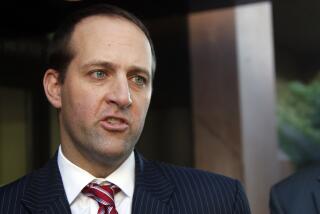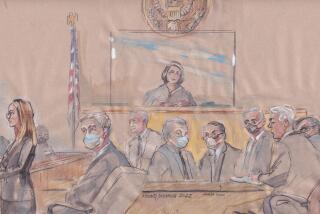Jury Gets Case of 3 Teledyne Executives Accused of Helping Rig Defense Contract
- Share via
WASHINGTON — Three Teledyne Industries executives provided “grease for the skids” of an elaborate conspiracy to fix a $24-million electronics contract, federal prosecutors said in closing arguments Monday shortly before the first trial in the Ill Wind Pentagon corruption investigation went to the jury.
Assistant U.S. Atty. Joseph Aronica said that the three executives--George H. Kaub, Eugene R. Sullivan and Dale Schnittjer--authorized payments of $160,000 knowing that the money would be used to bribe a Navy official to steer the contract to Teledyne.
Defense attorneys countered that the three Teledyne officers were innocent victims of a conspiracy concocted by four men who already have pleaded guilty to fraud and bribery charges.
Teledyne Called Victim
“The only conspiracy was one to defraud Teledyne by these (four) men,” said Mark Tuohey, a lawyer for Sullivan, former vice president for finance at Teledyne Electronics, a Newbury Park subsidiary of Los Angeles-based Teledyne Industries Inc.
“They testified with a grant of immunity--but with a hammer over their heads,” Tuohey said of the four men who implicated the defendants. “They haven’t been sentenced yet. They have every motive in the world to save their almighty skin.”
The Teledyne trial, in U.S. District Court for the Eastern District of Virginia, is seen as a test of the government’s ability to prove that corporate executives knowingly participated in corrupt acts within the $150-billion-a-year Pentagon procurement system.
The government already has obtained the confessions of a dozen private consultants and government officials to charges that they bought and sold confidential Pentagon data in efforts to subvert the military procurement process.
Prosecutors hope to obtain guilty verdicts in the Teledyne case to prod unindicted suspects in the investigation into cooperating with authorities to help bring charges against higher-ranking officials.
Teledyne admitted its role in the scheme last month and agreed to pay the government at least $4.3 million in fines and reimbursements. The company blamed its involvement on a former marketing official, Michael Savaides, but it maintains that three executives now on trial are innocent. Teledyne is paying the defendants’ legal costs.
Four men--Savaides, Navy procurement officer Stuart E. Berlin and consultants Fred H. Lackner of Woodland Hills, Calif., and William L. Parkin of Alexandria, Va.--already have confessed to criminal fraud and bribery charges.
The government is trying to prove that the Teledyne executives hired Parkin, a former high-ranking Navy purchasing official, because of his access to senior Defense Department officials who could help the company obtain the electronics contract.
The three executives looked the other way when presented with clear signals that Parkin was using Teledyne money to bribe a former colleague, the prosecution alleged.
“The evidence clearly establishes that each and every one of the defendants entered into a conspiracy,” Aronica told the jury. “They are aiders and abettors of the bribery of Stuart Berlin.”
The prosecution case is built largely around evidence obtained from wiretaps on Parkin’s phone. The jury heard Parkin press Schnittjer for money, shortly after Schnittjer joined Teledyne Electronics, saying: “Nobody works for nothing any more, and it takes a lot of spaghetti and meatballs to grease the skids on some of these things.”
Schnittjer’s lawyer, Stan Mortenson, said that Schnittjer had no idea what Parkin was talking about and had no reason to conclude that “spaghetti and meatballs” referred to cash payoffs to a Navy official.
The jury received the case Monday afternoon after detailed instructions on the charges and the law from District Judge Richard L. Williams. Defense attorneys predicted that it would take jurors at least a day and a half to reach a verdict in the complicated case.
Kaub faces a sentence of up to 85 years in prison and a fine of up to $2.5 million if he is found guilty. Sullivan and Schnittjer face sentences of up to 50 years.
More to Read
Inside the business of entertainment
The Wide Shot brings you news, analysis and insights on everything from streaming wars to production — and what it all means for the future.
You may occasionally receive promotional content from the Los Angeles Times.









